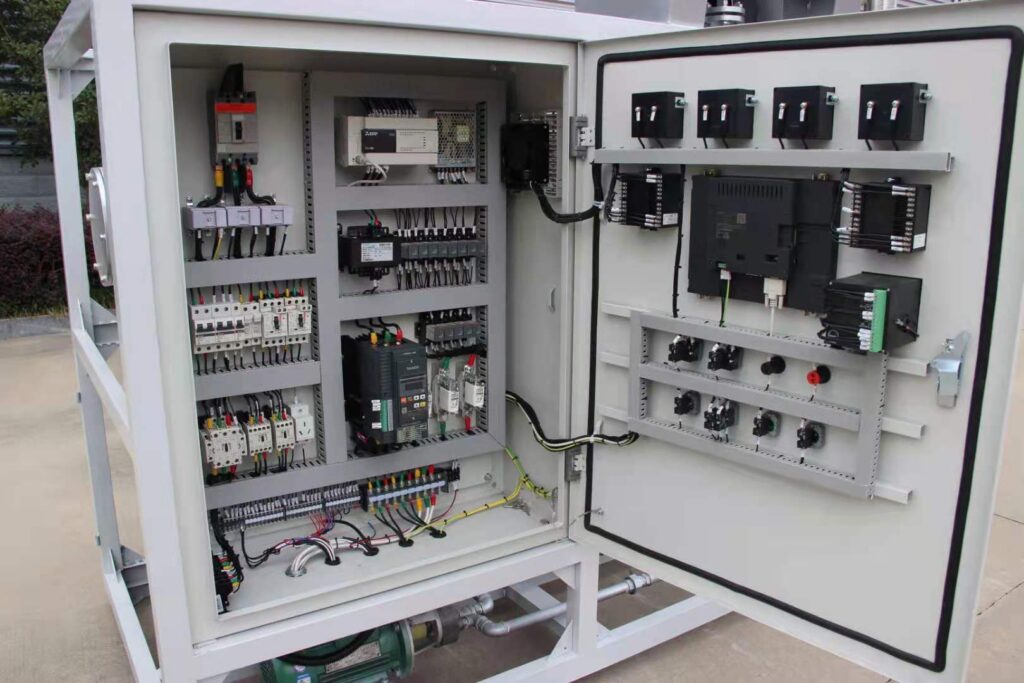
1. Overview of heat transfer oil boilers
Thermal oil boiler is a commonly used equipment for industrial heating, which provides stable and continuous heat energy through thermal oil as the heat transfer medium. Unlike traditional steam boilers, thermal oil boilers are able to work at lower pressures and provide more efficient heat transfer, so they are widely used in the fields of chemical, petroleum and food processing.
2. The working principle of heat transfer oil boiler
A thermal oil boiler heats the thermal oil inside the boiler by burning fuel (e.g. natural gas, oil, coal, etc.). The heat transfer oil circulates through the heating system in the boiler, absorbing heat and transferring it to the equipment to be heated through the piping system. The workflow is as follows:
- fuel combustion: The fuel is burned in the combustion chamber and the heat generated is transferred to the heat transfer oil through the wall of the heat exchanger tube.
- Thermal oil heating: Heat transfer oil absorbs heat in the boiler and then increases in temperature, forming a high temperature oil stream.
- heat transfer: The heated heat transfer oil circulates through the pump system and eventually transfers heat to the heating equipment in the industrial production line.
- Hot oil reflux: The heated heat transfer oil passes through a heat exchanger, where the temperature is lowered and enters the boiler again for heating.
The key to the working principle of a thermal oil boiler is the high temperature stability of the thermal oil, which enables it to transfer heat efficiently over a long period of time while avoiding the pressure fluctuation problems commonly found in steam boilers.
3. Ways to improve the efficiency of heat transfer oil boilers
Improving the efficiency of a heat transfer oil boiler not only saves energy, but also extends the life of the equipment. Below are a few common efficiency improvement methods:
- Optimisation of the combustion system: Ensures complete combustion of the fuel and reduces heat loss in the exhaust gases by regulating the combustion process in the burner.
- Regular cleaning of heat exchangers: The heat exchanger in the boiler tends to accumulate dirt and soot, and regular cleaning ensures that heat is transferred efficiently and thermal efficiency is improved.
- Increase hot oil temperature: Heat exchange efficiency can be improved by increasing the temperature of the heat transfer oil, but the safety of the equipment needs to be ensured to avoid overheating.
- Use of high-efficiency burners: The use of modern, high-efficiency burners can effectively reduce fuel consumption and improve the overall efficiency of the boiler.
- Rationalisation of boiler capacity: Choose the boiler capacity reasonably according to the actual needs, avoid overload operation or no-load operation, and ensure that the boiler works in the optimal condition.
4. Heat transfer oil boiler common problems and solutions
- High temperature of heat conduction oil: If the temperature of the heat transfer oil exceeds the set value, it may lead to a decrease in boiler efficiency and increase the equipment failure rate. The amount of combustion should be adjusted in time to avoid overheating by installing a temperature control system.
- Heat transfer oil leakage: Heat transfer oil leaks are a common safety issue, and boiler pipework and pumps should be checked regularly to ensure that the system is sealed to avoid leaks.
5. Summary and recommendations
A thermal oil boiler is a highly efficient and safe heating device for a variety of industrial applications. By understanding its working principle and adopting reasonable efficiency enhancement measures, the operating efficiency of the boiler can be significantly improved and energy costs can be saved. In the process of use, the boiler system should be checked regularly to ensure its safety and stability.
Our company can non-standard custom products, click the menu bar to contact us to customise, you can also refer to the first!product pageAppreciate our company's products oh!
Recommended Reading:
